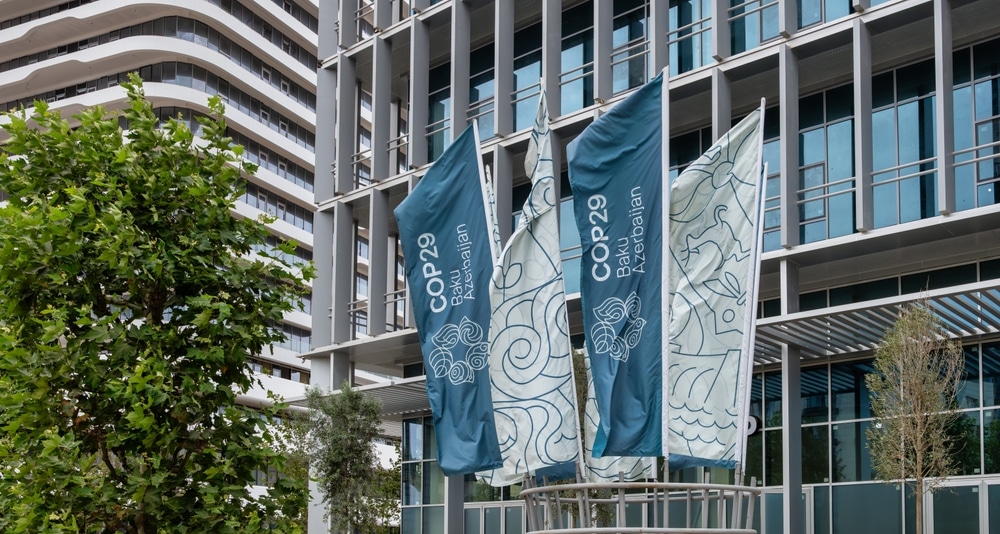
Why Beijing Hosting Sibos 2024 Matters: Our Takeaways from the Global Financial Services Event

Sandpiper Appoints Hermen Chow to its Financial and Professional Practices in Hong Kong
Credibly Joining the Conversation – How to Meaningfully Engage at COP29
November 2024

By Camille Middleditch, Deputy General Manager of Sandpiper’s office in New Zealand. Camille specialises in Environmental, Social, Governance (ESG) advisory and investor communications. She works across a range of sectors including energy and environment, healthcare, infrastructure, technology, and financial services.
“It’s not what you say, but how you say it” doesn’t apply when it comes to communicating sustainability. This is the key point for organisations to bear in mind before joining the COP conversation.
Taking place from 11 to 22 November in Baku, Azerbaijan, COP29 will bring together world leaders, policymakers, scientists, activists, and business leaders to negotiate and advance collective climate commitments. The conference presents an alluring opportunity for organisations to showcase their sustainability initiatives, contribute to critical conversations, build strategic partnerships, and influence the global climate agenda.
Tempting as it is to jump into the conversation, organisations that wish to communicate during the summit must first ensure any commentary on sustainability is demonstrated credibly to avoid reputational damage. As revealed in Sandpiper’s Global Reputation Capital Index 2024, ESG and sustainability remain significant weak spots for organisations. While progress in ESG and sustainability is rated as an important reputational area by 83% of respondents, only 39% self-rate their organisations as strong in this area.
The quality of organisational ESG and sustainability communications is also raising concerns, with 43% of respondents saying they don’t believe that their communications are accurate. Inaccurate content is a huge reputational risk at a time when ESG failings are attracting greater scrutiny from regulators, drawing attention from media, and facing backlash from consumers.
Sandpiper’s research also shows poor scores for climate communications, with only 29% of respondents having established a climate communications strategy. Less than half (45%) say their organisations’ sustainability strategies are strongly aligned with the United Nations Sustainable Development Goals (SDGs).
Against this backdrop, it is important that corporates recognise COP29 cannot be treated as a mere bandwagon for public attention. To meaningfully engage with COP29, they need to first assess their ESG strategy, commitments, and positioning, before engaging with related and relevant topics.
How to engage if you have an ESG strategy
With a defined ESG strategy, a clear ambition, and targets supported by strong governance and leadership, organisations can assess what is material to their business and aligned with the key agenda items at COP29.
We know that climate finance is going to be a huge topic at this year’s COP, as is the energy transition. Other key topics will include capacity-building, technology, innovation, mitigation, land use, gender, just transition, and the ocean, among others.
For some large organisations – like financial institutions and energy providers – the agenda items on which to take a position tend to be more obvious. But for organisations that find themselves unsure which topics to engage on, there is a need to reflect on their corporate reporting suite and other stakeholder communications over the past 12 months to assess the most relevant topics for them.
It is important to look at stated sustainability ambitions and targets to see how these relate to the key topics at COP29, focussing on where your organisation is making progress, or the outcomes or context of the conference that might allow you to expand your ambitions.
In New Zealand, for example, the first mandated climate-related disclosures reports were published this year. In Australia, several organisations will begin reporting next year. As part of this reporting process, several companies have stated their Scope 3 emissions targets; and through the COP29 agenda, companies may look at how these targets can be advanced further in alignment with new commitments that come out of the conference.
Additionally, with a growing global movement recognising the value of nature, and the part businesses play in transitioning to a more resilient, nature-positive economy, there have been strong signals in both Australia and New Zealand that nature-related financial disclosure requirements will soon follow. Similarly, the Taskforce on Nature-related Financial Disclosures (TNFD) recommends a risk management and disclosure framework for businesses to identify, assess, manage and, where appropriate, disclose nature-related issues.
Ahead of being mandated to disclose and report on nature-related issues, businesses might already be embedding nature frameworks or considerations into their strategies. Where that is the case, nature and biodiversity protection could be a great topic to credibly engage stakeholders with around COP29.
If you don’t have a sustainability strategy
For those who don’t have defined ESG strategy or sustainability commitments on the record (as was the case with half of our Reputation Capital survey respondents), or who are in doubt that what they do have is accurate, COP29 could be a good time to listen and to assess how their organisation can align its planning and/or contribute to the commitments that come out of the conference.
With 12 months before COP30, where participants will agree to new Nationally Determined Commitments, organisations can work to define a pathway that gets their strategy in order leading up to this time next year. It could be that COP29 is a lever for your organisation to run focus groups internally, to start understanding what your employees think is material to your organisation or how they would like to see your business showing up on topics of ESG and in relation to COP in the future.
Following this, organisations can also define a calendar of content in the lead-up and in alignment with COP30, using thought leadership, social media content, media engagement, executive profiling or roundtable events that discuss ESG topics meaningfully, in alignment with your newly defined strategy. And if you are still unsure where to start, have a look at our September 2023 article that provides an introduction to ESG communications.
To ensure meaningful and credible engagement with COP29, it is better to focus on specific parts of your sustainability agenda than to try to engage on all the macro topics at the summit, which may be less relevant to what you are working on as an organisation or even carry the risk of reputational damage.
To credibly engage stakeholders on sustainability, what you do matters at least as much as what you say.





